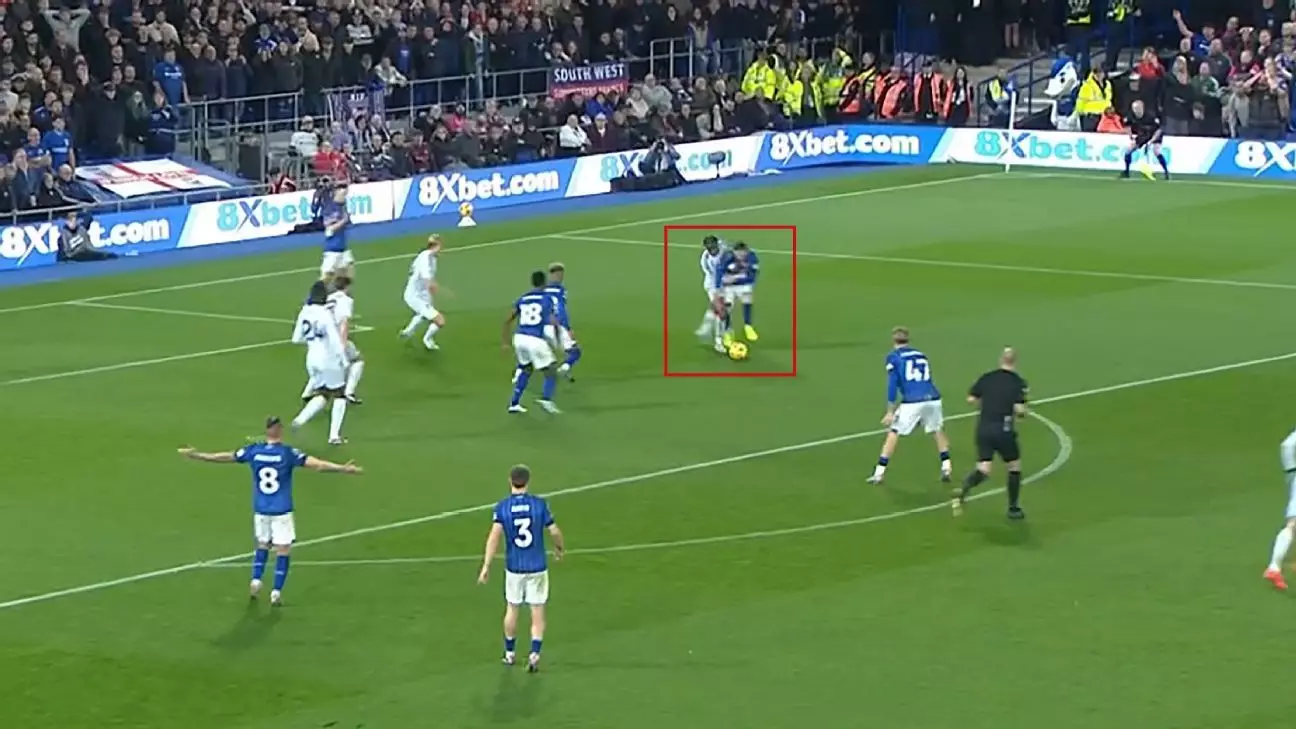Ipswich Town’s Chairman, Mark Ashton, has launched a vehement critique of the Video Assistant Referee (VAR) system following a contentious game that ended in a 1-1 draw against Leicester City. The match on Saturday revealed, once again, the frustrations that clubs such as Ipswich face regarding decisions made by referees and the ensuing consequences of VAR’s involvement—or lack thereof. As Ipswich led the game, an incident in the penalty area involving Conor Chaplin and Leicester’s Fatawu Issahaku became the epicenter of Ashton’s arguments, as the referee’s inaction led to significant repercussions.
The lack of a penalty call became even more consequential when a subsequent foul committed by Ipswich’s Kalvin Phillips resulted in his second yellow card, forcing him to leave the pitch. Ashton stated, poignantly, that the VAR system failed to intervene in a clear penalty situation, adding fuel to the ongoing debate surrounding its reliability and effectiveness. He articulate his discontent in front of the media, expressing that such occurrences represent a systemic injustice that, in his view, undermines the integrity of the sport.
In his heartfelt declaration, Ashton emphasized that his commitment to the club is unwavering, and he can no longer remain silent on the inconsistencies of VAR implementation across various matches. His prior message to Howard Webb, the chief refereeing officer of PGMOL, hinted at his proactive stance. By admitting that he foresaw potential unfairness in the match, Ashton took the initiative to communicate directly with Webb, anticipating a need to address concerns after the final whistle.
As the conversation progressed, he acknowledged a pressing need for clarity surrounding the criteria used to trigger VAR interventions. While some decisions are dismissed outright, others receive extensive scrutiny, leading to an environment of confusion not only for fans but also for players and coaching staff alike. Ashton’s perspective is rooted in a long career in football, allowing him to observe trends and discrepancies prevalent in officiating.
The systematic issues arising from VAR have been visible, not just in Ipswich’s case but across the Premier League and beyond. Ashton pointed out that this season alone, Ipswich has faced several VAR decisions that did not favor them, including penalties awarded against them and one overturned that could have worked in their favor. The instances paint a picture of a disjointed system where accountability seems lacking, raising questions about the efficacy of the technology intended to enhance fairness in the game.
Ashton voiced his frustrations regarding the apparent absence of accountability in the decision-making process surrounding key match incidents (KMIs). While one of Ipswich’s own appeals was deemed a refereeing error, it was categorized below the threshold for VAR intervention, leaving Ashton and his team questioning the validity of the criteria in place. This inconsistency magnifies the narrative that while VAR aims to introduce fairness, it inadvertently complicates the situation, leading to feelings of disenfranchisement among smaller clubs.
With ongoing discussions about whether to retain VAR in future seasons, Ashton hinted at a potential change of heart. Reflecting on previous support for the system, he implied that, had he been asked again, he may not exhibit the same level of endorsement. The need for transparency and consistency from the refereeing bodies has never been more crucial, and Ashton’s calls for reform echo a broader sentiment in the football community.
Moreover, the asymmetry between larger clubs and smaller teams invites speculation about favoritism within VAR implementations. While Ashton refrained from making outright accusations, his commentary subtly acknowledges a concern that smaller clubs may not receive the same level of support as their more prominent counterparts. This perception lingers, especially when scrutinizing refereeing decisions that seem to favor the historical giant clubs.
The issue illustrated by Ashton’s dissent regarding VAR transcends Ipswich Town and touches upon a broader narrative within football. As frustrations mount, the critical need for dialogues about refereeing standards and VAR’s future remains an urgent priority. Ultimately, clubs, players, and fans alike seek assurance that the sport they love is governed by fairness and transparency, devoid of systemic injustices that could tarnish its integrity. The outstanding question remains: can the governing bodies evolve and adapt to restore trust before more clubs voice their dissent?

